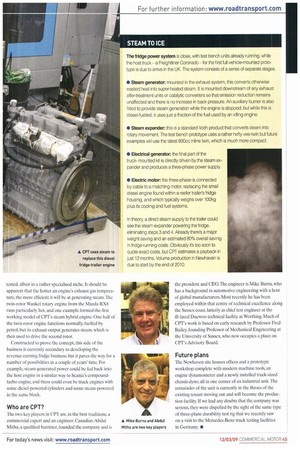The fridge power system is close, with test bench units
Page 45

If you've noticed an error in this article please click here to report it so we can fix it.
already running, while the host truck — a Freightliner Coronado for the first full vehicle-mounted prototype is due to arrive in the UK. The system consists of a series of separate stages.
• Steam generator: mounted in the exhaust system, this converts otherwise wasted heat into super-heated steam. It is mounted downstream of any exhaust after-treatment units or catalytic converters so that emission reduction remains unaffected and there is no increase in back pressure. An auxiliary burner is also fitted to provide steam generation while the engine is stopped, but while this is diesel-fuelled, it uses just a fraction of the fuel used by an idling engine.
• Steam expander: this is a standard Voith product that converts steam into rotary movement. The test bench prototype uses a rather hefty vee-twin but future examples will use the latest 800cc inline twin, which is much more compact • Electrical generator: the final part of the truckmounted kit is directly driven by the steam expander and produces a three-phase power supply.
• Electric motor: the three-phase is connected by cable to a matching motor, replacing the small diesel engine found within a reefer trailer's fridge housing, and which typically weighs over 100kg plus its cooling and fuel systems.
In theory, a direct steam supply to the trailer could see the steam expander powering the fridge, eliminating steps 3 and 4. Already there's a major weight saving and an estimated 80% overall saving in fridge running costs. Obviously it's too soon to quote exact costs, but CPT estimates a payback in just 12 months. Volume production in Newhaven is due to start by the end of 2010.




















































































































































